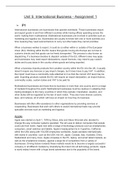Samenvatting
Zeer uitgebreide samenvatting en uitwerking werkgroepen / hoorcolleges / besproken literatuur
- Instelling
- Universiteit Utrecht (UU)
In dit document zijn al mijn aantekeningen van Regulating Big Tech samengevoegd, gecategoriseerd, bewerkt en samengevoegd. Zo ontstaat er een zeer overzichtelijk document waarmee je in mijn jaar het tentamen zonder moeite met een goed cijfer af kon sluiten. Nadruk ligt op de werkgroepen.
[Meer zien]





